Peter MALONE
Saturday, 18 September 2021 19:49
Divergent
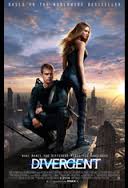
DIVERGENT
US, 2014, 138 minutes, Colour.
Shailene Woodley, Theo James, Kate Winslet, Ashley Judd, Tony Goldwyn, miles teller, Miles Teller, Jai Courtney,
Directed by Neil Burger.
For a PR savvy producer, Divergent may not be the immediate choice for a popular film title. However, with Veronica Roth’s series of novels, Divergent, Insurgent, Resurgent, the word takes its place prominently in the world of young adult novels and films. By the time of Divergent, there is a tradition with the Twilight series, that Hunger Games series, following in the footsteps of Harry Potter.
Audiences will notice a great number of similarities between Divergent and The Hunger Games series, prominently the central character being an energetic and resourceful young female. The men are in supporting roles. And, in the case of Divergent, the malevolent authority figure is also female.
Shailene Woodley, so effective in her performances in The Descendants and The Spectacular Now, is Beatrice Prior, who chooses her pesonal name, Tris, as she enters into her equivalent of hunger games, training in the action of The Dauntless. The overall supervisor Jeanine, is played by Kate Winslet.
Once again, this is a futuristic story, in this dystopian world, 100 years after a devastating war and focused on the city of Chicago. For organisation’s sake and keeping the peace, the population is divided into five factions, with homeless rejects from the factions, the faction-less. The factions are: Abnegation (selfless), Amity (peaceful), Candor (truthful), Erudite (intelligent) and Dauntless (brave), based on their personalities.
But there are individuals who do not fit easily into these categories, transcend several of them, who are viewed with suspicion as undermining the system. They are the Divergents. It is no surprise to find that Tris is a Divergent.
Tris comes from a family of the abnegation faction. This faction is in charge of ruling the city, her father (Tony Goldwyn) is an official and her mother (Ashley Judd) is a Divergent. Her brother chooses Erudite.
A great deal of the film is taken up by the training of The Dauntless, ultra-tough methods, ruthlessly applied by the commander, Eric (Jai Courtney). His second in command, Four (Theo James) is a more ambiguous character with whom Tris forms a bond. Needless to say, Tris overcomes her limitations and becomes one of the key Dauntless.
As might be suspected, there are rumblings in some of the factions, resenting Abnegation being the rulers. This is fomented by Jeanine and her technical program to eliminate abnegation from its key role. This leads to factional uprisings and violent confrontations with the Dauntless.
While the main focus in this film is the training of The Dauntless, the action is leading to insurgency which paves the way for the sequel, Insurgent.
Those who’ve read the novels will be eager to see the films. For those who have not read the novels, the film may be an interesting introduction – but more for the young adult targeted audience rather than the adult audience.
1. The trend for films targeting Young Adult audiences? The tradition and its influence on this film? The Hunger Games? The heroic central character? Her being tested? In a dystopian society?
2. The title, the tone?
3. The society, dystopian, 100 years in the future, centred on Chicago?
4. A peaceful community, the strict divisions in the factions, people choosing their faction, remaining in it, trained in it? Abnegation (selfless), Amity (peaceful), Candor (truthful), Erudite (intelligent) and Dauntless (brave), based on their personalities? The Erudite and their superiority? Amity and the tilling of the land? The Dauntless and their policing society? Abnegation, self-sacrifice for the good of others? The homeless, faction-less? The divergences Divergents and their being considered non—conformists and the enemy, to be got rid of?
5. The visuals of the fact factions, the areas, the clothes, manners, activities, the quiet of the Erudite? The charity of abnegation? The exhilaration and action of the Dauntless?
6. The secrecy about the Divergents, targets of the other factions, especially the Erudite?
7. The city, futuristic, yet similar enough to an identifiable Chicago? The developments in technology and weapons over the hundred years?
8. Jeanine, her role in the community, authority, control, her assistance, inspecting, picking the elite? Her interest in Tris?
9. The Prior family, in the Abnegation faction, the father and his involvement in administration, helping the poor, accused of insurrection? The mother, a role in the family, in Abnegation? The later revelation that she was a Divergents? At home, the meals, the brother, Tris and her place on the family, her age, education?
10. The young people having a choice their faction? The preparation, the test? Tris and her test, the reaction of the administrator, realising she was a Divergents, keeping her secret? Her later intervention?
11. The ceremonial, administered by Jeanine? The young people and their choices, the brother becoming an Erudite? Tris and her hesitation, choosing the dauntless Dauntless? Her parent’s reaction, acceptance? The fact that the children will be separated from their parents because of the different factions?
12. The presentation of the Erudite, elitist, the laboratories, investigations, discussions, superior, thinking they were born to rule?
13. The Dauntless, changing into the uniforms, the spartan area for the dormitory, toilets and showers, equal for everyone? Eric and his command, a hard man, brutal? The contrast with For, seeming hard, the touch of the genial (and the later explanation that he was a Divergents concealing himself)? The group and the tests, Peter, his seemingly carefree attitude, Christina, small, ambitious? William and his being part of the group? The call for volunteers? Tris going forward, the fall, it being softened, falling through to the ground? The fights, the confrontations? Eric and For and the test, the teams, Tris and her leadership, the ferris wheel, Four and his vertigo? Tris and her tactics, climbing the tower, winning the competition? The return and her sliding along the line to the headquarters, exhilaration, the break? Her being congratulated? The test of the group, those to be eliminated and to become faction less? Trish, her being injured in the fight, sleeping for 24 hours, being roused, going on the train to join in the competition? Her graduating? The group rejoicing?
14. Jeanine, her moving around the factions, observing?
15. The character of Four, seemingly part of the authoritarian leadership? Participation in the tests? Yet his reticence? His interest in Tris, helping her, gradual revelation and her realisation, the attraction, sexual? His becoming part of the resistance? Yet his being programmed to work against Abnegation? His being freed from the programming? His father, the accusations against him, his being part of the rebel group, reunited with his son?
16. Tris seeing her mother, the conversation, the danger? Realising her mother was a Divergents?
17. Jeanine and the machines to program the Dauntless police, they’re massacring the Abnegation group?
18. Tris, her mother, the pursuit, her mother saving her, her mother’s death? Going home, her brother and he is moving away from the Erudite, her father and his grief, leadership?
19. Tris, confronting Jeanine, the fight, closing down the program? The Dauntless coming to their senses? Stopping the killing?
20. Abnegation being saved – and the preparation for the sequel? Insurgent?
Published in Movie Reviews
Published in
Movie Reviews
Tagged under
Saturday, 18 September 2021 19:49
Aim High in Creation
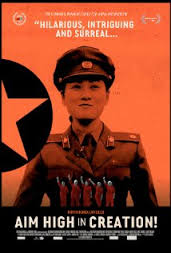
AIM HIGH IN CREATION
Australia, 2013, 96 minutes, Colour.
Anna Broinowsky, Peter O’ Brien, Matt Zemeres, Susan Prior, Kathryn Beck, Elliott Weston.
Directed by Anna Broinowski.
Aim High in Creation is a very interesting film as well is an entertaining one. And it is quite ambitious in its scope.
Anna Broinowsky is a Sydney documentary filmmaker, well-known for her expose of a fake Middle Eastern story in Forbidden Lies. Faced with the possibilities of fracking and exploration for coal seam gas, especially in Sydney Park, she decides to join protests, and to make a film to persuade people against fracking. The plan is to make a short propaganda film that will move all audiences to action.
Discovering a manual for filmmaking, written by the leader of North Korea, Kim Jung Il, with its five principles for filmmaking, highlighting emotions, images, music and a propagandistic appeal to audiences, she decides to go to North Korea to consult with the local industry.
One of the advantages of the visit and permission to go to this isolated country is that the audiences have a chance to see the country itself, the cities, the film industry, as well as meet various people, especially those in the film industry, one of the fastest in the world, all very agreeable.
In Korea, she has the benefit of being advised by two of the most prominent directors, one a favourite of the Dear Leader, as well as his favourite actress and his favourite musical composer. As the audience listens to them and watch their films and put their principles into action, and we realise that the sensibilities are very, very different.
In the meantime, she has chosen local Sydney actors to participate in her short propaganda film. They have the opportunity to look at the footage of her interviews in Korea, to see them put into action the sequences in her intended film. The mother in the film, played by Susan Prior, is advised to wear a scarf to work, overalls and a set of tools around her waist. And a Korean composer gets an orchestra to play his song and communicate his poetic and sometimes down-to earth lyrics (including the fact of putting manure on the gardens). The daughter in Anna’s film, played by Kathryn Breck, watches some tae kwon do practice, with three versions of how the fight for the film might be done, tough martial arts stuff. Also in the Australian cast is Elliott Weston as the husband and musician, Matt Zemeres is an engineer working for the coal seam gas company and Peter O’ Brien as the villain, the executive heavy. Their Korean counterparts rehearse in a variety of scenes. And we see the director urging his performers to do some running awesome exercises to release energy for their emotions in the performances.
Reinforcing the importance of the cause is a scene where a farmer from Dalby explains what has happened on his farm, the nearby fracking, the company set-up, the chimney to burn off gas, the methane in the water, illnesses of his children…
Finally, the film is made in Sydney, using all the advice from North Korea – which, of course, to local audiences is more on the hilarious side rather than the social protests side. Cultural sensibilities are quite different – though the audience in North Korea, watching it on the computer, think the film was a great success.
There have been very serious films about fracking, including the two Gasland documentaries. There is also the feature film, The Promised Land, written by and starring Matt Damon and John Krasinski.
But with its novelty, Aim High in Creation, will probably stay in people’s memories – its inventiveness and its humour reminding people of an important cause.
1. A creative idea? Ambitious? A film against coal seam gas and fracking? Decisions made about making a propaganda film? Enlisting the help of North Korea?
2. The director, her career and work?
3. The choice of North Korea, audience attitudes towards this country, its isolation, unknown? The visuals of the city, modern, public buildings and their size, scope, style? The studios? The bowling alley? The audience having an experience of North Korea?
4. The cult of Kim Jung Il? From the 1930s, closing North Korea, Communist rule, socialist attitudes, the importance of the party, Rigid, puritanical, attitudes towards the rest of the world, towards Asia, told South Korea, the United States?
5. North Korean movies: the clips, visual impact, plots, characters, situations, emotions, songs, propaganda? Rousing the people to support the cause?
6. The manual by Kim Jung Il? His interest in movies, his vast collection of American movies, his urging remakes of American movies? Adherence to his manual? The two directors in the film, the old and the new, his favourite actress, composer? His control of productions? The propaganda aimed within North Korea and outside?
7. Anna, her life in Sydney, the coal seam gas, the variety of companies exploring, the map and the vast amount of the exploration on the east coast of Australia, the emblems of the companies, and not responding to enquiries? Sydney Park? The protests? The badges? Anna distributing propaganda with her daughter, the daughter’s response? The idea for the film? Perfect propaganda to win and promote the cause? The manual, the decision to go to North Korea, its reputation, the idea for consultation about the film? Her packing – and the range of prohibited objects, including mobile phones, from Korea?
8. Travelling to North Korea, the capital, meeting the various personalities, the role of the translator? The interviews? The director and his advice? The cast and the director, emotions, exercises to release energies for performance? The two different directors and the sequences from their films?
9. The composer, his role in the past, the Deer Leader urging changes, melodies that can be learnt? The lyrics? For Anna’s film? Poetic and ideological – including the manure for the garden?
10. Beginning with nature images, eliciting emotions, the music?
11. The Sydney group, the introduction to each, their watching on the computer the film from North Korea? The discussions, the rehearsals, interviews? Karen as the mother, Sally is the daughter, Peter O’Brien? as the promoter, Elliott Weston as the husband and composer, Mitch and his being an assistant to the company? The personalities of the actors? Their interactions? Rehearsing together?
12. The Darlinghurst sequence, the stand promoting fracking, the people coming by, balloons and sweets?
13. The insertion of the discussion with the farmer from Dalby, his explanations, emotions, the illnesses of his children, the visuals of the burning of the gases, the methane in the mud?
14. The tae kwon do, the three fights visualised from Korea, the group watching, the rehearsals, Korea, the rehearsals in Australia?
15. Anna and her film, in Korea? The sequence, the actors, the Navy, protecting the island? Her going to the bowling alley, the explanations, the many takes, her fluffing the scenes?
16. Filming in Australia? In the Korean style?
17. The film, the Gardner, Karen, her scarf and the tools on the advice of Korea? The imagery of the flowers, her planting? Her flower design? The flashbacks, overhearing the plotting about the fracking and the tunnel? Her husband in the song, walking through the streets of the suburb, the shopkeepers looking? Sally, tae kwon do, the encounter with Mitch, falling in love, her mother and the protests, Sally at the meeting, denouncing her mother? The meeting, the executive and his speech, his lies? The parallel sequence with the South African promoter in real life? Karen, on the hill, the shopkeepers giving Sally flowers for her mother, her putting in them in the garbage, her discovery of the truth, spurning Mitch, the crowds, the speeches, the fight, Triumph?
18. The North Korean seeing the film and being happy with it?
19. The film highlighting the propaganda film, its preaching, its blatant appeal, not an Australian sensibility?
20. The final comments on the film not winning the cause, the fracking continuing, but not in Sydney Park?
Published in Movie Reviews
Published in
Movie Reviews
Tagged under
Saturday, 18 September 2021 19:49
Armstrong Lie. The
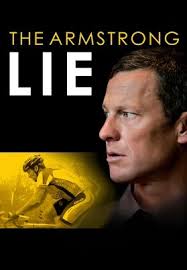
THE ARMSTRONG LIE
US, 2013, 124 minutes, Colour.
Lance Armstrong, Frankie Andreu, Betsy Andreu, Johan Bruyneel, Michele Ferrari, George Hincapie, Daniel Coyle, Phil Liggett, Bill Strickland.
Directed by Alex Gibney
The Armstrong Lie was not the original title for writer-director, Alex Gibney’s, documentary on Lance Armstrong. Rather, Gibney had been looking at Armstrong’s career after he had won seven Tour de France titles and, after his bout with cancer and his setting up of a worldwide foundation for children with cancer, his comeback in 2009 to ride one more Tour de France. Despite rumours of Armstrong’s use of enhancing drugs, he was a hero to millions of people and Gibney followed him on this 2009 ride. The intended title was The Road Back.
But, as everybody now knows, Armstrong was found out, denounced by former friends and associates, and eventually, in 2013, gave an interview on the Opera Winfrey Show where she asked him directly about his use of drugs. He admitted to their use. Later in 2013, he agreed to do an interview with Alex Gibney and talk about himself, his lies, his drug use as well as his charity work.
Fans of cycling will have much more background as they go in to watch this film, look again at Armstrong’s rides, some of which are described in the voice-over commentaries of the times as ‘astonishing’. They will know several of the cyclists who are interviewed. They will know a number of the journalists and authors who also agreed to be interviewed. Those who do not know so much about the sport but are aware of Lance Armstrong, his career and his downfall, will be fascinated with the interviews, both his strenuous denials of drug-taking in the past, his admitting to the truth in recent years.
Most audiences, looking at the earlier interviews, will be completely baffled as to how Armstrong could have said the things that he did, keeping a straight face, defying interviewers, even ridiculing a number of them. How he could be incomplete public denial seems not only mysterious but incredible.
Alex Gibney has directed a number of very impressive documentaries including Enron: the Smartest Guys in the Room, the Oscar-winning Taxi to the Dark Side, about American torture in Afghanistan, and the film about Americans sexual abuse by clergy in Sins of the Fathers, Silence in the House of God. In this present film he has been able to bring together his earlier footage for the more triumphant-intended documentary as well as sequences outing Armstrong and his deception.
The film does give the opportunity to give something of Armstrong’s background, growing up in Texas, with a single mother, highly competitive at school and in cycling, moving in the 1990s to some championships which led to his entry into the tour to France of 1999, his winning and the subsequent six wins to 2005. He himself often quotes his sense of competitiveness, his desire to win, and certainly his desire not to lose. He is praised as being determined, but denounced as being domineering and dominating.
For those not in the know, the frequent and lengthy excerpts showing Armstrong riding and his tactics will seem too long – though they seem necessary in building up this portrait of Armstrong. On the other hand, the many vistas of the multitude of cyclists in various scenic spots in Europe are most arresting.
This time the film opens with the interview with Opera Winfrey and Armstrong answering her directly. It continues with the interview with Gibney. It is in this context that the film then retraces Armstrong’s career.
Of great interest are the very many interviews with fellow cyclists, who give their impressions of Armstrong as a person, as a character, as a cyclist. Very significant are the 2005 interviews with Frankie Andreu and Betsy Andreu, his wife, who are quite blunt about Armstrong’s use of enhancing drugs – which, at the time, he vigorously denounced. Of great interest also are other comments by cycling journalists, authors of books about cycling, one of them highlighting Armstrong’s previous partnership with George Landis, and his falling out with him leading to Landis also denouncing him.
Perhaps it is not a balance to what Armstrong has done, but there is some effective footage in the film, showing him at the time of his experience of cancer and the chemotherapy and its brutal consequences. It also shows his foundation, his travelling the world to raise millions of dollars for children with cancer, his visiting the wards and being with the children. In the 2009 footage, especially when the official organisations suddenly send personnel for blood and urine tests, he is seen with his two daughters. A human touch.
In the film which runs just over two hours, there is a great deal of material – and quite a long time to look at Armstrong himself, his face as he denied drug-taking, his face as he talked with friends and clashed with enemies, his face as he finally spoke the truth. And audiences will be still puzzling about how such a high flier could have kept the deception going for so long and then fallen so far.
Published in Movie Reviews
Published in
Movie Reviews
Tagged under
Saturday, 18 September 2021 19:49
Look Again
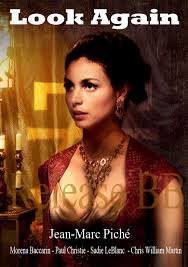
LOOK AGAIN
Canada, 2011, 87 minutes, Cover.Colour.
Morena Baccarin, Paul Christie, Sadie Le Blanc, Chris William Martin, Alex Carter. Maxim Roy.
Directed by Jean- Marc Piche.
Look Again is a Canadian telemovie with an American setting, a kind of murder mystery that is in the vein of the novels by and films of the novels of Mary Higgins Clark. The focus is on a female heroine, played by the attractive Morena Baccarin, a kind of Anne Hathaway look-alike.
The plot concerns the murder of her fiance, her friendship with a fellow estate agent, her friend’s engagement, the heroine suspicious of the fiance, interactions with the police, meeting an artist, his being under suspicion, the final confrontation and the rescue of the heroine.
Popular ingredients, an easy watch on television, especially for women’s audiences pulled termed the film is targeted, though the screenplay and direction are by men.
1. A popular television murder mystery? The appeal? To women’s audiences? Women’s characters and situations? Male villains? Romance?
2. The Chicago setting, filmed in Québec? Apartments, art spaces, business offices, homes for sale? Realistic atmosphere? For a melodrama? The musical score?
3. Setting the scene: Alison and Nancy doing their exams, the celebration, the phone call from Zach, Alison going to the house, disturbed, the attack by the intruder, Zach arriving, chasing him, stabbed to death?
4. Alison and her grief, Nancy trying to help her? Myra and her work at the office, Alison passing the exam, the status? Her sense that the attacker was still at large? Detective Jennifer Marshall, her concern, investigations, questioning?
5. Nancy and her relationship with Mike? Alison suspicious of him, a sense of him? The smell of Cologne, of limoncello? Her wariness, talking with Nancy, looking him up on the Internet, his police record, his driving her to the dinner, her reaction to the marriage proposal? The talk at the party, hostility? His confiding in Nancy, her giving him an alibi when he did not want one, his slapping her?
6. Alison, the dinner with Rick, going to the concert, to the gallery, the portraits, his wife? The gallery owner, friendly, her later explanations about the wife’s suicide? Rick’s drinking? Alison and her suspicions, going to his studio, the jewellery, his finding her? Alison hitting him, the ambulance? Her confusion? Her being attacked again in the house?
7. The Detective, following through? Alison and her confusion? In the parking area, the attack by Mike, his explanation of what he had done, his confession, about to kill Alison, Rick disturbing him and Alison hitting him? The arrest?
8. The Detective, the documents, Mike’s being fostered, Keach as his father, searching for him, his dying wife’s anxiety for him? Not telling the truth, helping him? Realising Mike’s violence, his killing of Myra, Myra and her friendship with Alison, confiding, teachers party, her being with Keach on the night of the killing, Mike killing her? Keech and his threatening Alison in her apartment? The motivations for reputation and business success?
9. The confession, Jennifer Marshall and the police about to arrest Keach, his killing himself?
10. Nancy and her dismay? Alison meeting with Rick? Her future?
Published in Movie Reviews
Published in
Movie Reviews
Tagged under
Saturday, 18 September 2021 19:49
Get Carter/ 2000
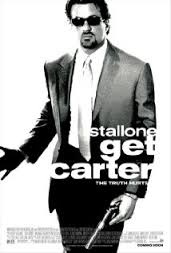
GET CARTER
US, 2000, 102 minutes, Colour.
Sylvester Stallone, Miranda Richardson, Rachel Leigh Cook, Michael Caine, Mickey Rourke, Rhona Mitra, Johnny Strong, John C. Mc Ginley.
Directed by Stephen Kay.
Get Carter is a remake of Mike Hodges’ classic gangster drama, the British version of Get Carter. It was a significant film for Michael Caine in the central role.
30 years on, the action is transferred to the United States and the film given an American flavour despite the presence of Michael Caine himself and Miranda Richardson. Caine seems to be relishing his role and is offering support for this film version.
Sylvester Stallone is strikingly different from Michael Caine in his screen presence. This is a typical Stallone performance, a tough man, bent on vengeance, not afraid to confront people, to be bashed himself as well as bashing and killing others. He is investigating the death of his brother, allegedly drinking and in an accident, but ultimately revealed to be murder. There is a strong supporting cast of characters, especially Rachel Leigh Cook as his brother’s daughter, caught up in the pornography racket. Mickey Rourke appears as a quite despicable gangster character.and John C Mc Ginley turns out to be sinister as Stallone’s partner. Also in the film is Alan Cumming as a young IT expert, very rich, easily corrupted.
The film is as expected, a vengeance film with some brutal violence, Stallone moving through it with a kind of inevitable nemesis, and with a strong supporting cast. The film was directed by Stephen Kay, who directed such films as Angel Eyes and The Mod Squad.
1. The remake of the 1970s thriller with Michael Caine? Transfer into the United States? Vehicle for Sylvester Stallone? Michael Caine in a supporting role?
2. The world of drugs, pornography, use of the Internet, gangsters?
3. American cities, ordinary, homes, funerals? Bars, the streets, pornography? The musical score?
4. The violent tone, revenge film, touches of brutality?
5. Sylvester Stallone as John Carter, the background of his life, leaving the city, leaving his brother and his family, his work, partnership with McCarty?, news of his brother’s death? His return, his brother’s wife and the discussions, his brother’s daughter, meeting the gangsters, old friends and associates, his investigation? suspicions about his brother’s death?
6. His search, the interrogations, confrontations, building up information, people lying to him, the fights, deaths?
7. His brother’s wife, friendship in the past, the tension in the marriage, the brothers drinking? Discussions with Carter, her being hurt?
8. The daughter, her age, seeming to ignore Carter, coming to talk with him, his reassurances, the revelations, the discussions on the roof, the experience of the pornography, the clubs? The relationship with her mother? Brumby and his wanting the disk with the pornography?
9. Brumby, his role, the club, information, his knowledge of Carter, smooth talk, the links, with Cyrus Pace, with Jeremy Kinnear? The pornography industry? Wanting the disk? Eddie, working in the bar, talking with Carter? The revelation that he was the partner in the film? Carter confronting him and his fall out the window?
10. Cyrus Pace, past friendship with Carter, the prostitution, pornography, arranging the parties, the lies, the confrontation? The role of Kinnear? Hired killers? The fight with Carter, his death?
11. Mc Carty, the deals, his arrival, the thugs, the confrontation?
12. The lead to Jeremy Kinnear, his being intimidated, his fears, his wealth, information technology expert, his connection with Pace, Brumby? The confrontation with Carter, the threats, his fear, being let off? His presence at Pace’s parties?
13. The combination of the investigation, the vengeance? Carter and his moving off to a new phase in his career?
Published in Movie Reviews
Published in
Movie Reviews
Tagged under
Saturday, 18 September 2021 19:49
Little Hut, The
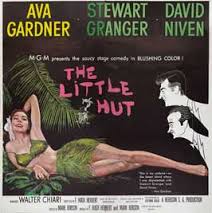
THE LITTLE HUT
UK, 1957, 78 minutes, Colour.
Ava Gardner, Stewart Granger, David Niven, Walter Chiari, Finlay Curry, Jean Caddell, Richard Wattis.
Directed by Mark Robson.
The Little Hut is based on a French play by Andre Roussin. It has that Gallic sense of naughtiness, so prominent in the comedies of this period. But it is in the context of British properness, prim and proper surface, touches of smouldering under the surface.
The film establishes itself with the British aristocracy, Ava Gardner playing the wife of a knighted sailor, played in a different fashion from his usual roles by Stewart Granger. David Niven is more like his other screen performances as the aristocratic friend, in love with his friend’s wife. They flirt a great deal – which is not picked up by the rather stolid husband.
After establishing the situation, with a visit from Niven’s parents, a clergyman played by Finlay Curry and his wife, Jean Caddell, the wife persuades her husband to take them on voyage on his ship. They hire an Italian chef played by Walter Chiari in his first film. And then they are shipwrecked.
Despite the odds, all the conveniences seem to be washed ashore so that the trio lives very comfortably. Granger is all practicality, setting up all kinds of conveniences and useful gadgets, also keeping a log. Gardner seems to be enjoying herself. But Niven is by himself in the little hut and proposes a situation whereby Granger, as captain of the ship, is able to grant a divorce and then marry the new couple. It doesn’t quite work out this way. And then Chiari turns up masquerading as a local native. All quite farcical.
This is one of Ava Gardner’s most attractive performances. David Niven always has good timing and a comic touch. Stewart Granger play something of the opposite of his usual screen presence, rather than an adventurer, he is a touch of the stolid British obsessive.
1. Comedy of the 1950s? Enjoyed with the retrospect? How would it be filmed in later decades?
2. The film based on a play, French, the variation on bedroom farces? The adaptation to British characters and British properness of the 1950s?
3. British government officials, Henry and his role in the foreign office, the aftermath of the Coronation and the dig at British bureaucracy and inefficiency? His attraction to Susan, regret that she married Philip? The visit of his parents, his father a clergyman, their surprise at his behaviour, Susan’s presence?
4. Philip, on travels, his attitude towards marriage, love to his wife, yet British to the core? Susan and Philip trying to make him jealous? Playing a game and kissing? His benign interpretation?
5. Susan, frustration, urging full Philip to take them on the voyage? Henry coming? The cook and his meals?
6. The storm, Philip handling it, the wreck, stranded on the island? Most things being washed ashore – for their convenience and use?
7. On the island, Philip and all his building, the big hut, the little hut, the gadgets? Food available? Comfort and conveniences? Living as if at home?
8. Susan and Philip, romantic, the big hut? Henry, jealousy, taking Philip’s shoes, love for Susan, the proposal, her being shocked, angry at Philip and his comment about her attraction to men, urging Henry to discuss the possible divorce? Philip thinking it over, agreeing, his official role, the declarations? The issue of the hut?
9. Henry, wanting to get into the big hut, Susan’s resistance, the dog preventing him? Sleeping outside?
10. Henry and Philip, friendship, clashes? Philip and his orderliness, keeping the log?
11. Smelling the fish, the cook turning up disguised as a native, initially not recognising him, in the hut with Susan, her urging him to keep up the joke? His return, the rescue boat arriving?
12. Back home, Philip and Susan together, Susan pregnant, the chef as the butler? Henry having to accept reality?
13. The entertainment of this kind of farcical representation of characters and situations?
Published in Movie Reviews
Published in
Movie Reviews
Tagged under
Saturday, 18 September 2021 19:49
Addicted to Love
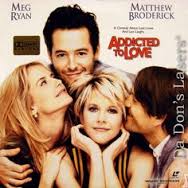
ADDICTED TO LOVE
US, 1997, 100 minutes, Colour.
Meg Ryan, Matthew Broderick, Kelly Preston, Tcheky Karyo, Maureen Stapleton.
Directed by Griffin Dunne
A 90s variation on the screwball romantic comedies of the past with Matthew Broderick abandoned by his girlfriend, Kelly Preston, taking up with Tcheky Karyo who, in turn, has abandoned his girlfriend, Meg Ryan, who was to help him get a green card.
Matthew and Meg meet in a conveniently abandoned building opposite the lovers, set up a surveillance system and set out to torment them. This gives a somewhat nasty edge to the comedy, especially with Meg Ryan trying a touch of Mad Max tactics. A bit hard to get really interested in the goings on or to feel much sympathy with them.
The was directed by actor, Griffin Dunne.
Not really addictive.
1. A romantic comedy? Black romantic comedy?
2. The charm or not in the romance? The credibility of the relationships between the couples?
3. New York City, apartments, streets, restaurants? The musical score?
4. The romantic introduction: Sam and his work in astronomy, his talents, predictions, meticulous detail? The telescope looking at Linda? Her waving? Working with the children, her planning to go to New York, her declarations of love, his not wanting her to go, her leaving?
5. Sam, Linda’s father, reading out her letter about the breakup? His being upset, going to New York, tracking down Linda?
6. Linda and Anton, in the apartment, the relationship, sexual relationship, the discussions, their being spied on?
7. Maggie, her arrival, dressed in black – the Mad Max touch? Her manner, abrupt, intrusive? Her wanting to spy on Anton? The story, in France, the relationship, fiancee, his getting the green card, the breakup? Her anger, spite?
8. Sam, setting up in the abandoned warehouse? The camera, the telescope? His reaction to Maggie, against her? The discussions, her winning him over, setting up the elaborate sight and sound surveillance?
9. Anton, his past, as a model, poor, coming to America, his speech about how wonderful America was? His restaurant, his talent in cooking? Cooking at home, using the same words to Linda as he used to Maggie? Sam appreciating his cooking? His affair with the financier and his confession?
10. Maggie and Sam and their attack? Bumping into Anton on the street and taking his credit card and using it? The scene with the monkey on Anton’s shoulder? Bribing the kids to spray perfume on Anton? His telling Linda, her reactions, laughing? Maggie and Sam dismayed?
11. Theor going to the apartment, moving things around, the sexual encounter, its meaning, their imagining the others?
12. Sam, going to the restaurant, applying for a job, tidying the flower vase as Anton would? His being hired, the hard work? Discussions with Anton, listening to his story? Anton recognising him, yet praising his strong stance? Sam going to the apartment, Maggie watching?
13. The cockroaches in the restaurant, Anton being ruined? Linda walking out? His complete devastation, and the rash from the strawberries, his itch, Sam thinking Anton was going to be run over by Maggie and pushing him over the fence and his being in a cast? Relying on Sam, inviting him to stay?
14. Sam, meeting Linda, happy? Her confession that she did not know what she was doing? Seeing the monkey in the park?
15. Sam, realising he loved Maggie and that she loved him, despite her manner? How credible this relationship?
16. Linda and Anton? Sam and Maggie? Maggie’s mother, the photos, mistaking him for Anton? The photos on the plane?
17. Sam’s return – and the happy ending? Possibly?
Published in Movie Reviews
Published in
Movie Reviews
Tagged under
Saturday, 18 September 2021 19:49
Blade Trinity
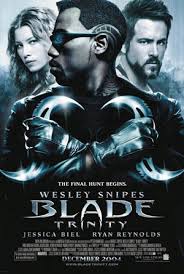
BLADE TRINITY
US, 2004, 108 minutes, Colour.
Wesley Snipes, Kris Kristofferson, Dominic Purcell, Jessica Biel, Ryan Reynolds, Parker Posey, Callum Keith Rennie, James Remar, John Michael Higgins.
Directed by David S. Goyer.
Short review: brutal and crass.
Longer review: brutal and crass with its body count and pretty coarse language.
The film is photographed well, many images quite striking. It continues the comic book crusade of Blade the hybrid human/vampire against the vampire plague. The first two films were frequently (and literally) dark. This one is set more in the daylight. The primordial vampire, born millennia ago in Sumeria, and living through the centuries, including his time as Dracula (and now referred to in dog Latin as hominus nocturnum) is resurrected by the current vampires so that he will help them to be able to walk in daylight. Blade is still battling and joins a kind of vigilante amateurs in a welter of slaughter. Not quite a body count in the usual sense - as each vampire explodes electrically.
Wesley Snipes remains stern and surly as Blade. Parker Posey (usually in independent films) enjoys herself in ludicrous hamming and Ryan Reynolds offers some deadpan humour, Jessica Biel some glamour. David Goyer wrote all three Blade films and directs this one. They were all quite brutal (that is, violence which is callous and ugly).
(The vampires and their exploding in fire as well as the warehouse of bodies were elements in I, Frankenstein.)
1. The third film in the series? Fans not so enthusiastic? Yet the same writer, now directing? The lore about vampires, their menace, in the ordinary world but unseen? The tradition of Blade, crusader and destroyer? Hybrid of vampire and human? The introduction of the age-old initial vampire, Dracula, Drake?
2. The title, the writer-director and his career, writing film versions of comic books?
3. The ordinary world, the cities, ordinary, the streets, buildings? The contrast with the underworld? Basements? The streets, the cars, bikes, apartments, weapons? The musical score?
4. The prologue, the excavations, the release of the power of the initial vampire? His appearance, his armour? Throughout the centuries? The Dracula legend? His now becoming the 21st century, Drake?
5. Blade, Wesley Snipes and his screen presence, dress, weapons, tattooes? His friendship with Kristofferson, helping him, getting him the potion to keep him alive? The bond, his help, the father of Abigail, the attack, his death? Dracula assuming his appearance to confront Blade and the Nightstalkers?
6. Blade going into action, the gangs in the streets, confrontation, destruction, their explosions by fire?
7. The police, the discussions, not believing in vampires? The bringing in of the psychiatrist, Blade seeing him on the television and his patter? The interview with Blade? The fact that he was a Familiar of the vampires? As was the police chief? The interrogation, the drugging of Blade?
8. Danica and her brother, their appearance, clothing, hair style? Vicious? The kingdom? Resurrecting Drake? His mission to kill Blade? Their self-confidence?
9. Drake, his look, strong, his memories, confronting Blade, the duel on the rooftops?
10. Blade, imprisoned, Danica and her defiance, using the opportunity to kill him? The rescue, the Nightstalkers, Abigail, King, their characters, appearance? Abigail as Kristofferson’s daughter? King as a former vampire? His repartee? The staff at the laboratory and their work, playing basketball, dead? The laboratory, the blind assistant, her daughter? The preparation for Blade? Preparing the virus to destroy Drake? The limited amount?
11. Drake and his being able to take on the appearances of characters, the psychiatrist, Kristofferson? The taunting of Blade about his need for blood?
12. Danica, her brother, the preparation for the confrontation? Danica and her henchmen, the big man and his wanting to fight? The build-up to the invasion, the fights, destruction? The warehouse, the fight, their taking King, the little girl, the taunts? The threats?
13. King and his repartee, defying Danica, fighting? Abigail and her battles? The arrival of reinforcements? The final confrontation? Blade and the virus, injecting it into Drake?
14. The police, their puzzling?
15. The end, order in the world, Blade surviving? More vampires?
Published in Movie Reviews
Published in
Movie Reviews
Tagged under
Saturday, 18 September 2021 19:49
Jane Doe: I Remember it Well
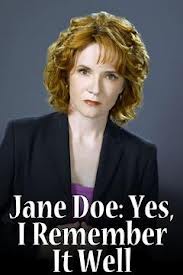
JANE DOE: I REMEMBER IT WELL
US, 2007, 85 minutes, Colour.
Lea Thompson, Joe Penny, William R.Moses, Clement von Franckenstein.
Directed by Armand Mastroianni.
The Jane Doe the series was very popular on television. Lea Thompson is an agreeable and active heroine, combining the skills of solving puzzles for a security organisation with action on the job, and maintaining a family, her husband and two children. By this time in the series, her husband knows what she does and is supportive of her. Joe Penny continues as agent Frank Darnell.
This time the puzzle is the disappearance of a British expert, with a mnemonic skill, memorising the names and details about foreign agents. He is abducted at the airport and the video material of the abduction is examined, revealing further clues. It seems to be a ransom attempt, with some deaths along the way.
However, the mysteries solved in an unexpected way. Much of this is due to the help of Cathy’s mother, Polly (Donna Mills enjoying herself) who is also a secret agent.
Several of the films were directed by the director of this one, Armand Mastroianni.
1. The popularity of the Jane Doe series? This film and its place in the series? The establishing of Jane’s character? Her being called on? Frank Darnell and his character and position? Cathy’s husband and his knowing what his wife was involved in, supporting her? The role of her mother?
2. The title, the professor and his mnemonic skills, Downing Street and its concern about his disappearance, the ransom? His knowing the names and identities of the many agents? The threat to security? The reliance on the human rather than on the computer and files?
3. The city, the Davis home, the children and their activities, the contrast with the security office, on the job, airports, wharves, action sequences, the city surroundings, homes, garages? Trailer and explosion? Sense of realism? Musical score?
4. The setup, the agent meeting the British, the professor, the interruption, the mace in the agent’s eyes, the escape of the professor, the video footage, his seeming disappearance, the close-up of the gun, the woman and her angle of walking, the gun? The worker and his photographing everything on his phone, Cathy seeking him out, his cooperation, the faces of the criminals?
5. Polly, her arrival, her background, suspicions about Cathy going out? Her own background? Following, looking at the video footage, meeting Simon and the memories of their connection 30 years earlier?
6. The identification of Ursula? The disguise? Phone calls? The ransom? With the case-snatcher, sending him to kill the driver, the drivers interview with Jane Doe? Her collusion with Ian? The plan for getting the money?
7. Cathy and Polly realising that Ian was part of the plot, hurrying to the trailer site where he had led them, the explosion?
8. The showdown at the airstrip, Cathy with the money, Ursula coming to get it, Polly shooting the gun out of her hand, Frank and reinforcements arriving? Cathy and her plea to Ian, talking about all the children whose lives would be destroyed? His giving in? His motivation for his treachery? Not being needed any more, outmoded?
9. Happy ending, Cathy and the family, Polly going with Simon?
Published in Movie Reviews
Published in
Movie Reviews
Tagged under
Saturday, 18 September 2021 19:49
That Uncertain Feeling
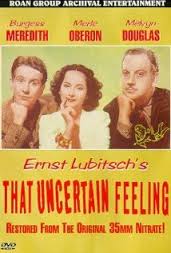
THAT UNCERTAIN FEELING
US, 1941, 85 minutes, Black and white.
Merle Oberon, Melvyn Douglas, Burgess Meredith, Harry Davenport, Eve Arden, Sig Ruman, Alan Mowbray.
Directed by Ernst Lubitsch.
That Uncertain Feeling is a comedy of the early 1940s, in the vein of the 1930s screwball comedy with its madcap situations and characters, but also with Ernst Lubitsch is rather more elegant filmmaking – Trouble in Paradise, The Merry Widow, Ninotchka.
The film is based on a play with a screenplay by Donald Ogden Stewart, Oscar-winner for The Philadelphia Story. The story is amusing rather than funny Though it does have touches of satire, about modern art, about self-centred pianists, about career-occupied financiers.
The film is a star vehicle for Merle Oberon who had appeared in many British films in the 1930s including Wuthering Heights. Her career in the 1940s was in American films such as Lydia. Melvyn Douglas had appeared in many similar films in the 1930s and was to go on to serious roles as the aged, winning Oscars for both Hud and for Being There. Burgess Meredith turns in an odd character, an eccentric pianist, self-absorbed but intrigued with Merle Oberon.
Slight, but entertaining in the 1940s kind of way.
1. The tradition of the screwball comedy, more sedate in the 1940s? Drama, comedy, satiric touches?
2. Black and white photography, production values, the city, apartments, doctors waiting rooms…? Realism as well as the satiric tone? The musical score?
3. The credibility of the situation, the six years of marriage, Larry and his focus on his work, Jill and her hiccups, the tension in her marriage and in her life, confiding in friends, going to the doctor?
4. Jill, Merle Oberon and her glamour, costumes, demeanour, her marriage, Larry’s seeming indifference, her response? The hiccups, and the doctor? The tensions in her life? Going home, the plan for the Hungarian dinner, the Hungarian word? Larry preoccupied with his work and insurance premiums?
5. Larry, Melvyn Douglas comic style, busy, seemingly indifferent, taking his marriage for granted? His plan for the dinner and the contracts? The words, the menu, the goulash?
6. Jill at the doctor’s office, the encounter with Andrew Sebastien, his eccentric manner, talking, the magazines, confiding, finding Jill’s photo, her happiness, his criticism? The arguments, her curiosity, wanting him to go? His taking her to the gallery, the modern paintings and his comments, his portrait and his explanation of the symbols? Getting a copy?
7. The Hungarian party, Sebastien turning up, his behaviour at the table, what he could eat or not, playing the piano? The meal, the Hungarian word, the enthusiasm of the guests, the guest of honour, his manner, his response to the dinner? Sebastien interrupting the discussion of the contract? Failing?
8. Sebastien and Jill, their time together, her falling out of love? Sebastien’s presumptions? At home, his continued playing the piano, Margie and her visit, the last straw for Jill? His leaving the house?
9. Larry, the reverse psychology, moving out of the house, seeming to agree with Jill, going to the apartment?
10. The divorce, with Mr Jones, with Sally, the contrived argument and Larry fluffing his lines, needing to slap Jill, finally doing so? The setup for the divorce? Jill walking out?
11. Larry and his going out with Sally, his pretending she was in the apartment, her arrival, the fact that there was a business meeting? Jill going along with
the pretence?
12. The reconciliation, the marriage and love reviving?
13. A pleasant comedy, in the style of the 1940s?
Published in Movie Reviews
Published in
Movie Reviews
Tagged under